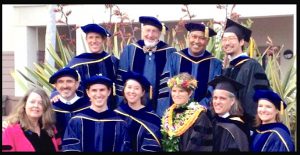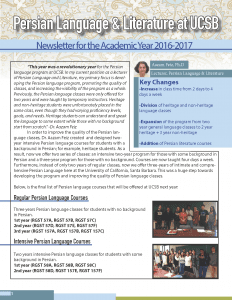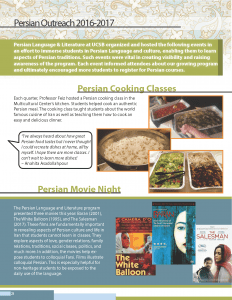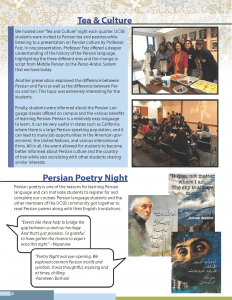About Our Graduate Programs
The Department of Religious Studies is nationally and internationally recognized as one of the world’s leading centers for the analytic study of religion and is renowned for its cross-cultural and multidisciplinary approach to the study of religions. The department offers training in the religious dimensions of the human experience in diverse cultures and traditions around the world and through the course of history. We embrace both humanistic and scientific approaches to the study of religions and emphasize the importance of advanced study of relevant languages. Our faculty members employ a diverse array of methods in their research and draw from a broad range of theoretical perspectives. Indeed, a rigorous multidisciplinary and analytic approach to the study of religions, often involving comparative perspectives across traditions, has been one of the enduring hallmarks of UCSB’s Department of Religious Studies since its founding sixty years ago, in contrast with our peer institutions whose programs have been founded on a seminary model rooted in ministry.
Our graduate program is designed to provide students with an understanding of classical and contemporary theories of religion, with the linguistic and methodological skills to conduct cutting-edge and innovative research, and with in-depth specialist training in cultural areas and religious traditions. The department has particular strengths in five cultural areas: South Asia (India, Pakistan, Bangladesh, Nepal, and Sri Lanka), Central Asia (Tibet and Mongolia), East Asia (China and Japan), the Americas (North America and the Caribbean), and the Mediterranean and West Asia. We offer training in a range of religious traditions within and across these cultural areas—including Hindu, Jain, Buddhist, Daoist, Shinto, Jewish, Christian, Islamic, Native American, and Black Atlantic traditions—along with traditions and communities that complicate this type of classification. The department also has strengths in philosophy of religion, with an emphasis on continental philosophy and Western thought. We are at the forefront of the study and understanding of a wide range of cultural practices, intellectual discourses, and popular constructs, exploring ways in which human beings make sense of the self, reality, and their place in the world.
Reflecting our commitment to a global perspective—and to the study of the world’s religions both comparatively and in depth—the department offers multiple language programs that are foundational to our graduate program and of service to other programs on campus. We offer training in Hebrew (Biblical and Modern), Aramaic, Coptic, Arabic, Persian, Sanskrit, Pali, Hindi, and Tibetan. Other relevant languages, such as Greek, Latin, Chinese, and Japanese, are offered by other departments. Our language programs provide critical training for graduate students pursuing textual or ethnographic research in particular cultural areas and religious traditions. At the same time, we provide training in strategic languages for those interested in enriching their professional careers in such fields as international business, NGO and policy work, or government service.
Our students are trained to deploy a range of disciplinary approaches in their study of religious traditions, drawing on philological, philosophical, historical, anthropological, sociological, psychological, and literary theories and methods as appropriate to their research. The required “200 Course” seminars provide focused, in-depth grounding in themes/problems relevant to the study of religion (e.g., race, materiality, tradition, the body, etc.). Students pursuing a doctoral degree in Religious Studies may petition to add the following Interdisciplinary PhD Emphases: Global Studies, Ancient Mediterranean Studies, European Medieval Studies, Feminist Studies, Cognitive Science, and Translation Studies.
Areas of Study
Graduate study in the Department of Religious Studies is structured in terms of general university and departmental requirements, including core courses required of all students, and additional requirements specific to each of the areas of study within the department. Graduate students may choose among the following areas of study:
- Buddhist Studies
- Christian Traditions
- East Asian Studies
- Islamic Studies
- Jewish Studies
- Mediterranean and West Asian Religions
- Native American and Indigenous Religions
- Philosophy and Religion
- Religion and Culture
- Religions of North America
- South Asian Religions
Master’s Program (MA Plan II)
This Master’s degree program, formally designated as MA Plan II, provides students with rigorous and interdisciplinary training in the academic study of religion and in the histories, languages, literatures, institutions, and practices of a variety of religious traditions. It is intended to prepare students who wish to pursue a doctoral degree in religious studies or related discipline as well as those wanting to enrich their professional careers in other fields, such as journalism, education, law, medicine, international business, NGO work, public policy, ministry, museum work or the arts. This Master’s degree is a flexible program. It can be completed in two years for those interested in completing a Master’s program in preparation for pursuing a PhD, or in one year, for those interested in enriching their professional careers. No thesis is required for this Master’s degree. Students who complete this Master’s program are eligible to apply for the PhD program in Religious Studies at UCSB.
PhD Program
The PhD program is intended for students who have completed a Master’s degree in Religious Studies or a closely related discipline with evidence of religion coursework. The doctoral curriculum provides students with in-depth training in the academic study of religion preparing them for a career as a college or university professor, or other careers where a doctoral degree is desirable.
MA/PhD Program (MA Plan I continuing into the PhD)
The MA/PhD program is intended for students with a Bachelor’s degree who show exceptional promise for doctoral study and have competitive qualifications with respect to their chosen area of study. Students admitted to this degree program complete the Master’s degree on the way to earning the PhD. Students in this Master’s degree program, formally designated as MA Plan I, complete a two- to three-year course of study that includes core proseminars, language study, and the writing of a Master’s thesis. Students who do not have competitive language preparation and/or qualifications (such as course background in the academic study of religion) to be admitted directly to the MA/PhD program are encouraged to apply for the MA Plan II degree. Prospective applicants to the MA/PhD program should consult with the Director of Graduate Studies to determine eligibility.
For more information:
- Graduate Program Assistant, Andrea Johnson
- Faculty Graduate Advisor, Prof. Rudy Busto
Graduate Division Website: http://www.graddiv.ucsb.edu/
















